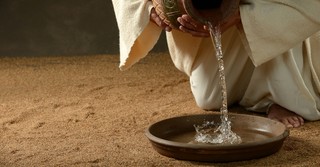
Change Translation
- Recent Translations
- All Translations
Videos for Luke 7:44

Luke 7:44 Meaning and Commentary
And he turned to the woman
That stood behind him at his feet,
and said to Simon, seest thou this woman?
and what she has done? pointing to her, and comparing him, and her, and their actions together, whereby he might judge of the preceding parable, and how fitly it might be applied to the present case:
I entered into thine house;
not of his own accord, but by the invitation of Simon, and therefore might have expected the usual civilities:
thou gavest me no water for my feet:
to wash them with, no, not so much as water; a civility very common in those hot countries, where walking without stockings, and only with sandals, they needed often washing; and which was very refreshing, and was not only used to travellers and strangers, but to guests, and was usually done by the servants of the house; (See Gill on Luke 7:38).
but she hath washed my feet with tears.
The Persic version reads, "with the tears of her eyes"; which made a bath for his feet;
and wiped them with the hairs of her head.
The Vulgate Latin, Syriac, Persic, and Ethiopic versions read only, "with her hair", which she used instead of a towel, when Simon neither gave him water to wash with, nor a towel to wipe with.
Luke 7:44 In-Context
Study Tools
PLUSUnlock Notes
This feature is for PLUS subscribers only. Join PLUS today to access these tools and more.
JOIN PLUSUnlock Highlights
This feature is for PLUS subscribers only. Join PLUS today to access these tools and more.
JOIN PLUSUnlock Bookmarks
This feature is for PLUS subscribers only. Join PLUS today to access these tools and more.
JOIN PLUSTrack Your Reading
Create a free account to start a reading plan, or join PLUS to unlock our full suite of premium study tools.